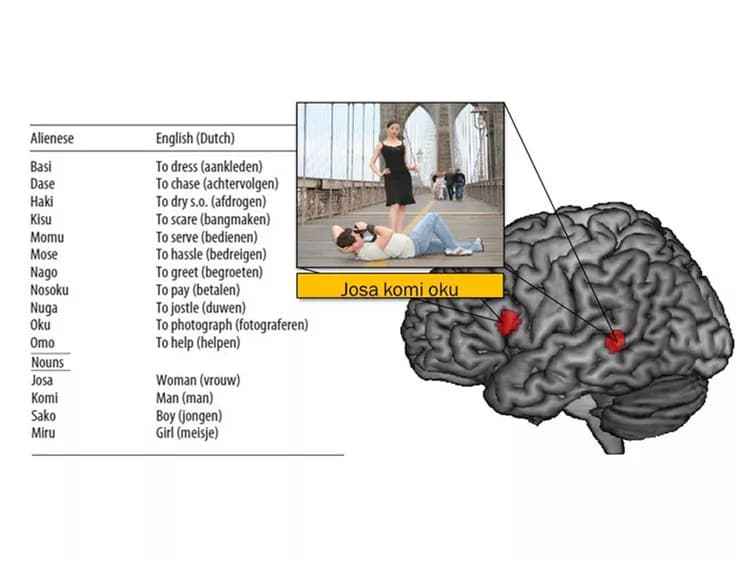Learning a new language is a difficult task. It requires skills for memorizing new words, learning how to put those words together in a grammatical way, and integrating them with existing linguistic knowledge. In a new study from researchers at the Donders Institute and Max Planck Institute for Psycholinguistics, these skills were observed through brain imaging as native speakers of Dutch learned an artificial miniature language 'Alienese'.
Reuse grammatical characteristics
The major discovery was that the brain cares whether or not the grammatical properties of the new language (in this case, word order) resemble the grammatical properties of your native language. If they are similar, your brain uses its own grammar in learning the new language. And if the word order of the new language differs from your mother tongue, your brain needs to build a new grammatical repertoire. For the first time, researchers have shown that it helps the brain if it can reuse characteristics of our mother tongue when learning a new language.
Josa komi oku
Alienese consisted of a set of words like josa 'woman', komi 'man', and oku 'to photograph'. These words could be combined in a particular order, which either did or did not conform for Dutch word order. For instance, both sentences Komi oku josa (man photograph woman) and Josa komi oku (woman man photograph) have the meaning "The man photographs the woman." The former sentence conforms to Dutch word order (and English), but the latter does not. Participants read sentences with familiar and unfamiliar word orders accompanied by pictures depicting the meaning (see image).
Language brain network
When the unfamiliar word orders (josa komi oku) were repeated, brain activation increased within regions of the brain network known to be involved for your native language. Lead author of the study Kirsten Weber proposes, "The enhanced activity might reflect a brain mechanism to build and strengthen a neural network to process novel word order regularities." When the familiar word order (komi oku josa) was repeated, brain activation decreased in language-related regions. "That we found suppressed activation on the other hand, supports our ideas that a known structure in a novel language quickly behaves like a structure in your native language. Processing a known structure is easier for the brain second time round. As a whole, our study shows that we seem to use the same brain areas for native and new language structures and that Alienese was in the process of being integrated into the participants existing language brain networks."
The above post is reprinted from materials provided by Max Planck Institute for Psycholinguistics. Note: Materials may be edited for content and length.
Disclaimer: DoveMed is not responsible for the adapted accuracy of news releases posted to DoveMed by contributing universities and institutions.
Primary Resource:
Weber, K., Christiansen, M., Petersson, K. M., Indefrey, P., & Hagoort, P. (2016). fMRI syntactic and lexical repetition effects reveal the initial stages of learning a new language. The Journal of Neuroscience.
Related Articles
Test Your Knowledge
Asked by users
Related Centers
Related Specialties
Related Physicians
Related Procedures
Related Resources
Join DoveHubs
and connect with fellow professionals


0 Comments
Please log in to post a comment.